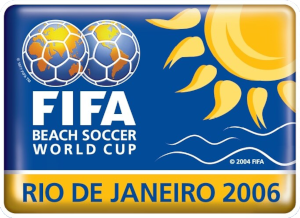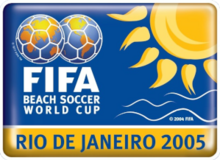
The 1930 FIFA World Cup was the inaugural FIFA World Cup, the world championship for men's national football teams. It took place in Uruguay from 13 to 30 July 1930. FIFA, football's international governing body, selected Uruguay as the host nation, as the country would be celebrating the centenary of its first constitution and the Uruguay national football team had successfully retained their football title at the 1928 Summer Olympics. All matches were played in the Uruguayan capital, Montevideo, the majority at the Estadio Centenario, which was built for the tournament.

The 1962 FIFA World Cup was the seventh edition of the FIFA World Cup, the quadrennial international football championship for senior men's national teams. It was held from 30 May to 17 June 1962 in Chile. The qualification rounds took place between August 1960 and December 1961, with 56 teams entering from six confederations, and fourteen qualifying for the finals tournament alongside Chile, the hosts, and Brazil, the defending champions.
Listed below are the dates and results for the 2006 FIFA World Cup qualification rounds for South America. 10 teams took part, all in a single group. The rules were very simple: the teams would play against each other in a home-and-away basis, with the four teams with most points qualifying to the 2006 FIFA World Cup. The fifth ranked team would have to play-off against the best team from Oceania, with the winner of this play-off also qualifying. For the first time, defending champions Brazil was required to go through the qualifying process and did not automatically qualify for the tournament.
Listed below are the dates and results for the 1994 FIFA World Cup qualification rounds for the South American zone (CONMEBOL). For an overview of the qualification rounds, see the article 1994 FIFA World Cup qualification.
Listed below are the dates and results for the 1982 FIFA World Cup qualification rounds for the South American zone (CONMEBOL). For an overview of the qualification rounds, see the article 1982 FIFA World Cup qualification.
The 1960 Copa de Campeones de América was the first season of the Copa CONMEBOL Libertadores, CONMEBOL's premier club tournament. Seven association's clubs entered the first competition, with three not sending a representative. The first match of the tournament was played between Uruguayan side Peñarol and Bolivian side Jorge Wilstermann on April 19 in Montevideo, Uruguay.

The 2006 FIFA Beach Soccer World Cup was the second edition of the FIFA Beach Soccer World Cup, governed by FIFA. Overall, this was the 12th edition of a world cup in beach soccer since the establishment of the Beach Soccer World Championships which ran from 1995–2004 but was not governed by FIFA. It took place in Rio de Janeiro, Brazil, from 2–12 November 2006.
The South American zone of 2010 FIFA World Cup qualification saw ten teams competing for places in the finals in South Africa. The format is identical to that used for the previous three World Cup qualification tournaments held by CONMEBOL. Matches were scheduled so that there were always two games within a week, which was aimed at minimizing player travel time, particularly for players who were based in Europe.

The 2007 FIFA Beach Soccer World Cup was the third edition of the FIFA Beach Soccer World Cup, governed by FIFA. Overall, this was the 13th edition of a world cup in beach soccer since the establishment of the Beach Soccer World Championships which ran from 1995 to 2004 but was not governed by FIFA. It took place in Rio de Janeiro, Brazil, from 2–11 November 2007.

The 2008 FIFA Beach Soccer World Cup was the fourth edition of the FIFA Beach Soccer World Cup, governed by FIFA. Overall, this was the 14th edition of a world cup in beach soccer since the establishment of the Beach Soccer World Championships which ran from 1995–2004 but was not governed by FIFA. It took place in Marseille, France, in the Plages du Prado from 17 to 27 July 2008. It was the first tournament to take place outside Brazil.

The 1995 Beach Soccer World Championships was the first edition of the Beach Soccer World Championships, the most prestigious competition in international beach soccer contested by men's national teams until 2005, when the competition was then replaced by the second iteration of a world cup in beach soccer, the better known FIFA Beach Soccer World Cup. It was organised by Brazilian sports agency Koch Tavares.
The 1996 Beach Soccer World Championships was the second edition of the Beach Soccer World Championships, the most prestigious competition in international beach soccer contested by men's national teams until 2005, when the competition was then replaced by the second iteration of a world cup in beach soccer, the better known FIFA Beach Soccer World Cup. It was organised by Brazilian sports agency Koch Tavares.

The 2009 FIFA Beach Soccer World Cup was the fifth edition of the FIFA Beach Soccer World Cup, governed by FIFA. Overall, this was the 15th edition of a world cup in beach soccer since the establishment of the Beach Soccer World Championships which ran from 1995 to 2004 but was not governed by FIFA. It took place in Dubai, the United Arab Emirates between 16 November and 22 November 2009. It was the second tournament to take place outside Brazil, first to be played in Asia, and the last tournament to take place on an annual basis.

The 2003 Beach Soccer World Championships was the ninth edition of the Beach Soccer World Championships, the most prestigious competition in international beach soccer contested by men's national teams until 2005, when the competition was then replaced by the second iteration of a world cup in beach soccer, the better known FIFA Beach Soccer World Cup. It was organized by Brazilian sports agency Koch Tavares in cooperation with and under the supervision of Beach Soccer Worldwide (BSWW), the sports governing body.
The 2004 Beach Soccer World Championships was the tenth and final edition of the Beach Soccer World Championships, the most prestigious competition in international beach soccer contested by men's national teams; the following year, the competition was replaced by the second iteration of a world cup in beach soccer, the better known FIFA Beach Soccer World Cup. It was organized by Brazilian sports agency Koch Tavares in cooperation with and under the supervision of Beach Soccer Worldwide (BSWW), the sports governing body.
The South American Zone of 2014 FIFA World Cup qualification saw nine teams competing for 4 or 5 berths in the finals. Brazil automatically qualified for the World Cup as the host nation so were not involved in CONMEBOL qualifying. Argentina, Colombia, Chile, Ecuador and Uruguay advanced to the World Cup.
The Second Stage of the 2011 Copa Santander Libertadores de América ran from February 9 to April 20, 2011.
The South American section of the 1962 FIFA World Cup qualification saw 7 teams competing 3 berths in the finals.
The second stage of the 2012 Copa Santander Libertadores de América ran from February 7 to April 19, 2012.
Group 1 of the 1962 FIFA World Cup took place from 30 May to 7 June 1962. The group consisted of Colombia, the Soviet Union, Uruguay, and Yugoslavia.








